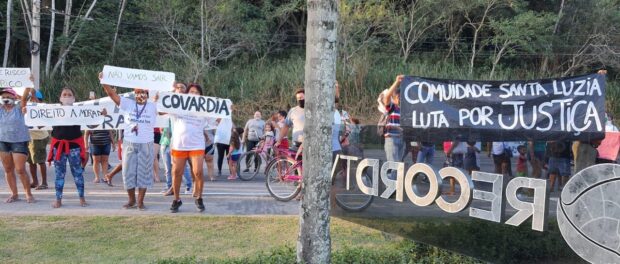
This is our latest article covering Covid-19 and its impacts on the favelas.
On August 11, the Popular Council, a collaborative network that defends housing rights and fights against evictions in the favelas of Rio de Janeiro, hosted a discussion, broadcast live on Facebook, about the city government’s history of forcing the urban poor off their land and its continued push to carry out evictions in the midst of the coronavirus pandemic.
The discussion was moderated by Breno Botelho, an activist with the Popular Council. The invited speakers included Mariana Medeiros, a lawyer and adviser to state legislator Flávio Serafini; public defender Viviane Tardelli; Indianara Siqueira, an activist and founder of Casa Nem, a shelter and refuge for LGBT+ individuals in Copacabana, in Rio’s South Zone; Fladimir Guimarães, a resident of the Santa Luzia favela, West Zone; Paulo Machado, president of the Trapicheiros favela’s residents’ association in Tijuca, North Zone; and Inês Deodoro from the Indiana favela’s residents commission, also in Tijuca.
The discussion highlighted the longstanding nature of violations of housing rights in Rio de Janeiro. Guimarães highlighted Santa Luzia’s decades-long trajectory in their fight to remain. Despite obtaining the status of an Area of Special Social Interest (AEIS) in 2009, along with 29 other communities in the surrounding Vargem Pequena area, the favela has not ceased being a desired area for the city and real estate developers, even as the pandemic rages. “The issue is very clear,” Guimarães said. “The poor can’t live in a rich area.”
Siqueira said that the current situation with Casa Nem, threatened with eviction, reflects similar dynamics of real estate interests, as the group is using an abandoned building in upscale Copacabana as their home. Additionally, anti-LGBT dynamics are at play: “[In the fight for housing rights] there is a lot of machismo, a lot of LGBTphobia.” Given that many people who live in Casa Nem are there because of lack of acceptance or support from their families, this creates an extremely dangerous situation for a group that is already highly vulnerable in Brazil.
Machado and Deodoro, both from favelas with a century’s history in Tijuca, discussed similar situations in their fights against eviction over the last few years. Deodoro said that it is critical to remember what the favelas mean to their residents, noting that residents have “houses built with a lot of blood, sweat, and tears… Every community has its positive aspects that tie us here.”
Machado said that the prejudice and racism of some residents of the next-door condominium, played an important role in the push to remove Trapicheiros, citing blatantly offensive posts in the Facebook group Alerta Tijucano. “They let us know clearly that we are visual pollution,” he described.
Allegations that favelas are an environmental blight play a large role in eviction threats. Machado argued that this perspective is highly misguided: “Look at our growth and then look at [theirs]…They deforested and devastated all of this, and they have the audacity to tell me that we cause deforestation.”
 For Medeiros, it is absurd that favelas are accused of being the polluters “when the reality is that they promote the maintenance of those spaces.”
For Medeiros, it is absurd that favelas are accused of being the polluters “when the reality is that they promote the maintenance of those spaces.”
The pandemic has only complicated what was already a dire situation for many favelas under threat of removal. “People are going to stay at home, but in what homes?” asked Tardelli, noting the virtual impossibility of social distancing for residents of these communities.
The government’s attempts at removal are fundamentally hypocritical, argued Medeiros: “Rather than promoting health, [their policies] promote insalubrity.”
Medeiros, who is closely following proposed legislation to stop evictions during the pandemic, expressed frustration over “unbelievable” judicial decisions regarding the issue, but remained hopeful that Rio de Janeiro’s State Legislative Assembly (Alerj) would be able to vote on it soon.
The speakers praised the role of collectives like the Popular Council and other groups that continue to fight alongside residents threatened with eviction, as well as the perseverance of residents who have stood up to the government.
Despite the challenges, they all stressed the importance of having hope. “Don’t give up,” Machado urged, saying that favelas have the strength to resist. “Trapicheiros is living proof of this.”

